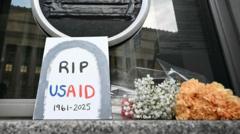Dr. Tom Wingfield from the University of Liverpool highlights the importance of USAID, which plays a critical role in combatting malnutrition, ensuring hygiene, and providing access to clean water, essential factors in reducing disease spread. The chance to combat infectious diseases effectively is now jeopardized, moving the world closer to a potential health crisis.
Organizations such as Frontline AIDS report that numerous partners have already been impacted, leading to disruptions in HIV and tuberculosis treatment programs in countries such as Uganda and South Africa. With the funding freeze creating widespread confusion, many organizations are left uncertain about their future operations and their ability to care for vulnerable populations. Experts warn that the long-term consequences of this aid suspension could be catastrophic, undermining years of progress in global health initiatives.
The cuts, coupled with the ongoing global challenges posed by climate change, threaten to reverse hard-won gains in disease control while simultaneously diminishing the international reputation of the US as a reliable partner in global health efforts.
Organizations such as Frontline AIDS report that numerous partners have already been impacted, leading to disruptions in HIV and tuberculosis treatment programs in countries such as Uganda and South Africa. With the funding freeze creating widespread confusion, many organizations are left uncertain about their future operations and their ability to care for vulnerable populations. Experts warn that the long-term consequences of this aid suspension could be catastrophic, undermining years of progress in global health initiatives.
The cuts, coupled with the ongoing global challenges posed by climate change, threaten to reverse hard-won gains in disease control while simultaneously diminishing the international reputation of the US as a reliable partner in global health efforts.




















